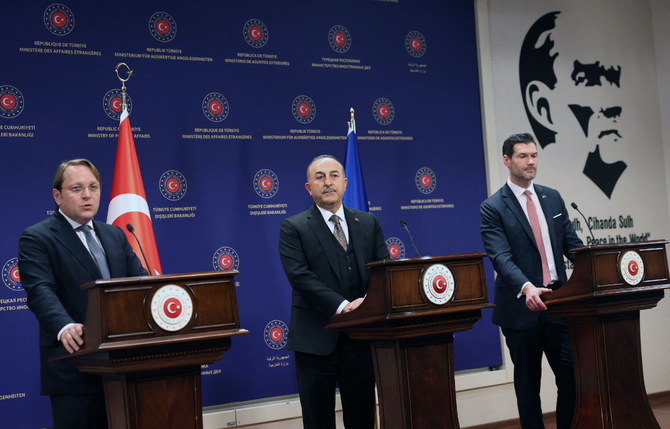How ‘earthquake diplomacy’ can mend EU ties with Turkey

https://arab.news/4sd6k
In what became known as “earthquake diplomacy,” Turkiye and Greece put decades of enmity behind them and provided aid to each other after a series of powerful earthquakes hit both countries in 1999. The mutual solidarity created a new climate that led to Athens dropping its objections to Turkiye becoming a candidate for EU membership.
This month’s earthquakes that killed nearly 45,000 people and devastated swaths of southeast Turkiye and northern Syria led to an outpouring of international support and solidarity. EU member states have provided all means of assistance, and are now organizing a donor conference in Brussels in March 16 to mobilize support for the victims of the earthquakes. Sweden, which currently holds the rotating presidency of the EU and has had difficulties with Turkiye for the past few months, will be the co-organizer of the conference.
Tensions have been high between Ankara and a number of EU states. Turkiye and Greece have come close to a military collision over disputes in the Aegean Sea. Ankara has also refused to ratify Swedish and Finnish NATO membership bids, primarily because courts in Sweden have so far denied Turkish requests to approve the extradition of dozens of people that Ankara links to terrorist organizations. The dispute with Sweden is more serious than with Finland, especially after the burning of a copy of the Qur’an in Sweden. Nine Western capitals closed their consulates in Istanbul and warned their citizens of “security threats.”
The EU states can build on this positive climate in their post-quake relations with Turkiye.
Sinem Cengiz
In the hours after this month’s earthquakes, both Sweden and Finland immediately responded to Turkiye’srequest for help — prompting the question of whether renewed “earthquake diplomacy” could soften Ankara’s stance toward the NATO applicants. However, even if policy makers in Finland and Sweden hope for a change in the climate similar to that of 1999, the political context seems fundamentally different.
In the coming months, the earthquake will be the only topic on Turkiye’s domestic and foreign agendas. There are difficult days ahead for Turkiye, both politically and economically. Most important are challenges on the humanitarian front, especially when it comes to how the wounds will be treated. Before the earthquakes, there were hopes in Sweden and Finland that they could receive Ankara’s support to ratify their membership after elections in Turkiye in May. However, amid the earthquake devastation there is a possibility that the elections will be postponed, because of difficulties in organizing voting. If that happens, Ankara’s objection to Swedish and Finnish bids could drag on into a NATO summit in July. Moreover, even if Swedish and Finnish humanitarian aid were not a “quid pro quo,” there is little chance of an immediate move from Ankara on ratifying their membership while it is devoting all its attention to internal issues.
However, there are things that the EU countries could do to keep the relations with Turkiye on a positive track. For instance, Germany is granting three-month visas to earthquake victims with relatives in Germany;other EU states could do the same. Second, consistent assistance is essential to rebuild quake-stricken cities. Turkiye has completed the first phase of the disaster response, which was the rescue. It now needs support in rehabilitation and reconstruction, and EU member states’ assistance is important. Finally, it was upsetting to see Turks working or studying abroad left emotionally alone after the disaster. More understanding and sympathy could be shown to Turkish students and scholars at EU universities; moral support is as important as material support at a time of such suffering.
European nations came to the rescue with their manpower and other support after the earthquakes, which was appreciated by the Turkish people. The EU states can build on this positive climate in their post-quake relations with Turkiye. Even if all the issues cannot be solved overnight, the humanitarian solidarity shown at this time could pave the way for some impetus in settling disputes that have been a source of tension for months.
• Sinem Cengiz is a Turkish political analyst who specializes in Turkiye’s relations with the Middle East. Twitter: @SinemCngz









































